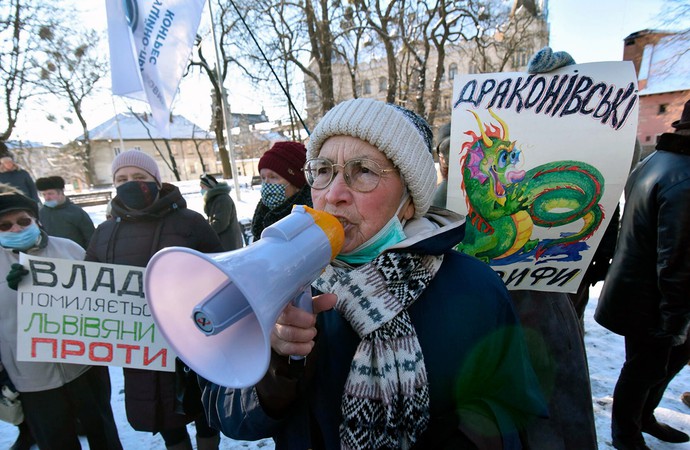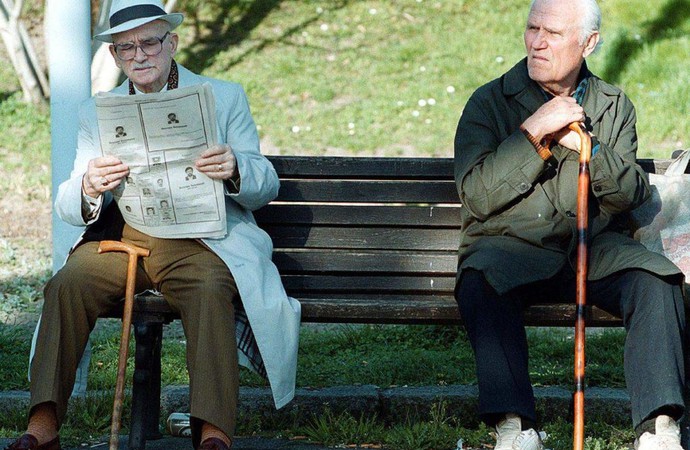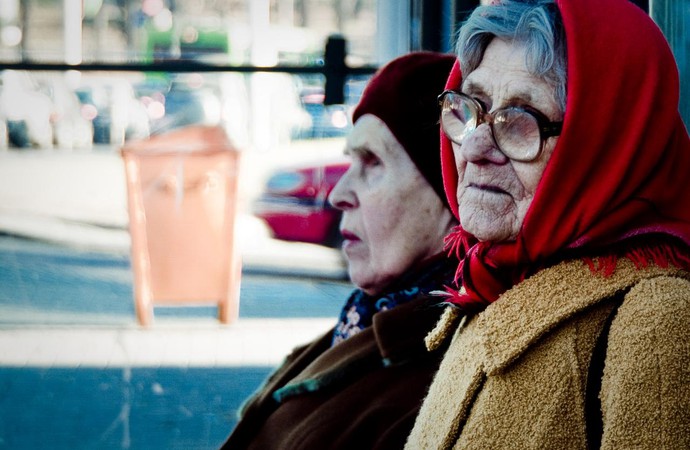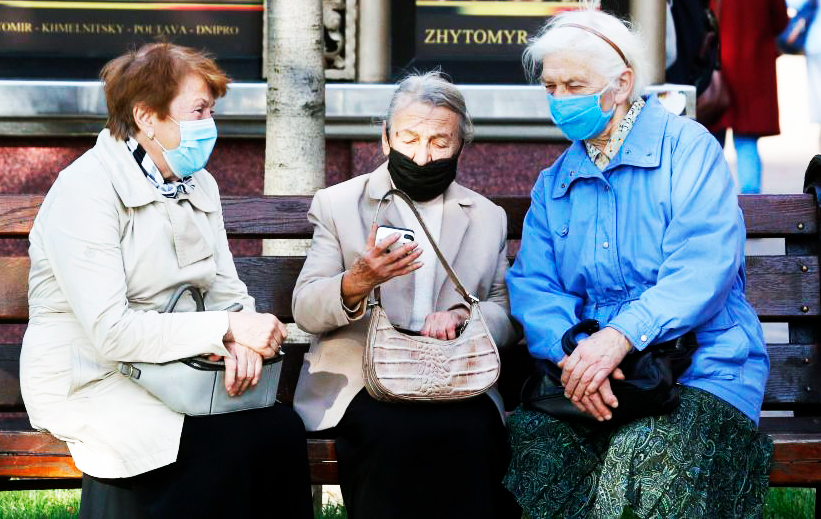In liberal political circles across the post-Soviet space, the word ‘babushka’ (Russian for grandmother) is often used to disparage older voters for their political backwardness. Young activists and liberal elites blame the older generation for the survival and popularity of paternalistic, corrupt and often semi-authoritarian parties, even in countries where elections are relatively free and fair. In their analysis, the typical ‘babushka’ is nostalgic for the paternalistic politics of the Soviet Union, where the state took care of everything and guaranteed some degree of stability.
The ‘babushka’ is thus attracted to charismatic ‘strongmen’ politicians who promise stability: retaining the surviving remnants of the Soviet welfare state, promising specific handouts or pension increases, and attacking liberal politics as corrupting traditional moral values and risking a return to the chaos of the 1990s. Liberal activists and reformers lament that ‘babushkas’ do not understand their reform agenda and the necessity to transform their country’s economic order.

However, liberal politicians and activists are also responsible for their failure to attract these older voters, since their ideological convictions and structural factors lead them to exclude them as ‘legitimate’ voters. By branding the elderly as ignorant nostalgics for their Soviet youth, liberals trivialise their political instincts. For many older people, their convictions are not always based on a naive nostalgia for the Soviet past, but a repudiation of the extreme neoliberal transition since 1991, which created massive poverty, insecurity and inequality. Older voters who remember the Soviet Union are less likely to buy into the trope popular among the younger generation that all socio-economic problems in post-Soviet states are the result of communism’s legacy, and not a consequence of what came after.
Moreover, they are less likely to embrace the ‘winner takes it all’ logic of neoliberal capitalism due to their ideological education in the Soviet Union, and they do not share the illusion with younger people that they will be one of the ‘winners’. The rapid privatisation of industries caused the emergence of oligarchs who used their vast wealth to dominate the political arena and protect their business empires by creating monopolies. Soviet industries were cannibalised and sold-off, leading to mass redundancies of workers. New trade unions emerged in the early 90s to replace the corrupt and passive Soviet trade unions and demand decent wages and conditions, but such labour activism was swiftly repressed by governments and oligarchs, leading to pitiful wages for workers. Adult mortality rates increased in most post-communist countries in the 1990s, yet research has shown that in countries which adopted rapid mass privatisation, mortality increased by an extra 12.8%, and male employment by 56.3%. The Soviet welfare state was defunded and dismantled, meaning people gradually lost access to the free healthcare, subsidised transport, childcare, sanatoria, gas and electricity which had made life in the Soviet Union bearable.
"For many older people, their convictions are not always based on a naive nostalgia for the Soviet past, but a repudiation of the extreme neoliberal transition since 1991, which created massive poverty, insecurity and inequality."
This is not an apology for the Soviet Union. It was a repressive authoritarian state, the command economy was erratic in its allocation of resources and the welfare state was often woefully inadequate. Yet the fact that conditions for pensioners significantly deteriorated after 1991 undermines the moral argument for neoliberal capitalism, which was implemented aggressively in many former Soviet countries. We should not deride older generations for their desire for stability: decent social security, workers rights and fair compensation for their labour. These are socialist and social democratic values which deserve to be genuinely represented in post-Soviet politics.
However, at the ballot box older voters are forced to choose between oligarch dominated parties with a pro-Western neoliberal agenda (such as European Solidarity or Servant of the People in Ukraine), or traditional pro-Russian oligarch parties which are (rhetorically) anti-neoliberal. Since liberal reformers often exclude older voters for their ‘Soviet nostalgia’ and pursue more neoliberal reforms, older voters are drawn towards traditionalist and paternalistic oligarchic parties. These are sham parties which act purely as vehicles for local and national elite interests. They scarcely deliver on their paternalistic policies other than sudden bursts of spending in the run-up to elections. Their voters are often painfully aware of this, but argue that it is better than liberal parties which talk of reforms but do not deliver tangible improvement (and may even privatise the remaining public services).
In Ukraine, the pro-Russian ‘Opposition Platform – For Life’ party, led by close Putin ally and oligarch Viktor Medvedchuk, frequently lambasts the government for raising gas prices in line with IMF recommendations. Such rhetoric is totally self-serving, as oligarch parties want to maintain control of lucrative rents from gas subsidies. Yet it strikes a cord with older voters, for whom the victory of ‘pro-Western’ liberal parties means price rises and service cuts without other tangible improvements in their quality of life. Older voters are also less susceptible to the identitarian messages of ‘pro-Western’ parties, since they often positively view the Soviet Union and are less likely to feel antagonism towards Russia (although in Ukraine this distinction is complicated by the strong regional divide, it holds in Armenia, Georgia and Moldova). Discussion of ‘liberal’ or ‘Western’ values are perceived as hollow if they are not accompanied by positive change.

Liberal politicians in the post-Soviet space claim that the solution to their country’s problems lies in destroying the last vestiges of the Soviet economy. They support removing subsidies, privatising state services and enterprises and deregulating the economy (‘removing red tape’) to attract foreign investment. They are supported in these by global financial institutions such as the IMF and the World Bank, as well as the US (the role of the EU is more ambivalent, as it supports liberal economic reforms but also strengthening worker protection).
In Georgia, the Saakashvili government eradicated almost all worker’s rights and kept the minimum wage at 1999 levels (currently less than 5 euros per month), as part of his drive to create a foreign investment paradise in Georgia. The government has avoided providing social security to many of the most vulnerable through political manipulation of the official subsistence minimum, which is far below the real amount needed to survive, and basing social security requirements on these figures. However, polling by the Friedrich Ebert Foundation found that 48% of Georgians fully support a minimum wage and 27% partially support one, and believe that an adequate minimum wage would be more than forty times the current amount.
Meanwhile in Ukraine, President Zelenskiy’s policies include the opening of the agricultural land market with limited regulation, risking the mass-transfer of undervalued agricultural land from the rural population to oligarchs and huge agro-holding companies, as well as ‘liberalising’ labour laws and increasing the pension age. In Russia, the government used the opening day of the 2018 FIFA World Cup to announce the raising of the pension age from 55 to 63 for women and from 60 to 65 (the average life expectancy) for men.
"Liberal politicians in the post-Soviet space claim that the solution to their country’s problems lies in destroying the last vestiges of the Soviet economy."
While there is some logic to dismantling parts of the post-Soviet state which were breeding grounds for corruption, new ‘liberal’ political parties which emerged after pro-democracy revolutions (such as the Euromaidan, Rose Revolution in Georgia and Velvet Revolution in Armenia) were often suspiciously selective, and much quicker at cutting public services than breaking monopolies. In Ukraine oligarchic monopolies in key industries such as gas and electricity were often spared major reforms, although they should be the obvious first target. In Georgia, which made the most serious effort to root out petty corruption in the region after 2003, dubious friends of the ruling party were somehow able to avoid the harsh criminal sentences and property confiscations faced by many former officials and businessmen.
In Armenia, the post-revolutionary government of Nikol Pashinyan has struggled to live up to promises of prosecuting oligarchs and the former regime. Yet it has assisted a private company to demolish one of Yerevan’s poorest districts – Firdus – and turn it into a new commercial and residential neighborhood, in a process rife with accusations of foul-play and legal violations, which risks expropriating residents without adequate compensation.
Supposedly ‘pro-Western’ liberal democratic parties across the region (European Solidarity and ‘Servant of the People’ in Ukraine, the ‘My Step’ Alliance in Armenia and the United National Movement in Georgia) fared little better than their more autocratic predecessors (the Party of Regions in Ukraine, the Republican Party in Armenia and various pro-Shevardnadze parties in Georgia) in reducing pension poverty and precariousness. After 1991, skyrocketing inflation eroded pensions and private companies frequently avoided paying pension contributions. Pension risk was increasingly individualised, and there was a shift from defined benefits to defined contributions, and away from a pay-as-you-go system. Attempts to increase the pension age were less successful, but given the extreme devaluation of pensions, the vast majority of pensions were forced to remain employed or engage in informal coping strategies such as household agriculture or taking care of grandchildren. Elder care is essentially socialised onto the family due to the lack of state services.

According to the ILO, the median income in Ukraine will generate a pension lower than the relative poverty line, while currently only 36 percent of the population aged 15–64 in Ukraine are contributing to the State pension system, meaning that in the long run more than 60 percent of the population could be ineligible for a pension. Georgia introduced a universal flat-rate basic pension in 2005 to reduce pension poverty, yet this minimum pension amounted to only 67$ per month in 2015, only marginally higher than the (devalued) subsistence minimum.
Meanwhile age-specific needs such as medical treatment and skilled care increase the risk of falling into deprivation. Older people are also less able to engage in intense periods of work to rescue themselves from financial emergencies. As a result of this vulnerability, older people are disproportionately affected by neoliberal reforms such as cutting state services and subsidies for transport, gas and electricity. In Ukraine and Georgia, they are disproportionately affected by the devaluation of the official subsistence minimum, as the minimum pension is linked to this figure. Since the main economic lifeline for many pensioners is ownership of their house or apartment given to them when the Soviet Union collapsed, they suffer from the failure to develop strategies to facilitate the capital repairs of Soviet housing. Often the solution which governments choose is the expropriation of tenants to make way for property developers, with little or no compensation.
"While ‘pro-Western’ parties celebrate their ‘European direction’, they ignore the social democratic aspects of Europe’s prosperity."
These neoliberal policies, which target economic growth through deregulation, privatisation and foreign investment offer nothing to appeal to the political values of older voters. While ‘pro-Western’ parties celebrate their ‘European direction’, they ignore the social democratic aspects of Europe’s prosperity, such as the welfare state, workers’ rights and redistributive policies. They tend to focus exclusively on the Western ‘free-market’ agenda which has eroded social protection across the continent with harsh austerity measures. Not only is this a questionable strategy for future prosperity, but it offers nothing for older voters with collectivist and socialist instincts and a memory of the Soviet past.
If left-wing movements wish to emerge in the post-Soviet space and challenge the paternalistic and neoliberal parties alike, they must abandon the negative stereotype of the ‘babushka’. They should understand that the demand for stability and social protection among large portions of the electorate are not simply Soviet nostalgia, but a repudiation of the neoliberal consensus in post-Soviet politics.
They must embrace policies which focus less on growth, and more on a recalibration of the extremely unequal and exploitative political order. They must also articulate a scepticism towards international organisations and Western powers which promote neoliberal reforms, without embracing Russia as an alternative ally. Rather than waiting for the ‘babushka’ to finally die and pave the way for a capitalist future, the left should show older voters that they are valued by society, and that their security and happiness is worth something.
